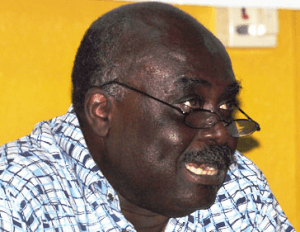
Dr Charles Wereko-Brobbey, Chief Policy Analyst at the Ghana Institute for Public Policy Options (GIPPO), has blamed the bloated voters register on weak mechanisms for national identification and for effective registration of births and deaths.
“We started an exercise 15 years ago in 2001, to produce a national ID card. That exercise is still incomplete. You would have thought, that a country that is almost 60 years, the idea of Kojo and Ama coming to point out Kwesi as Kwesi would have left us.”
The policy analyst said that every single voters register in the fourth republic has been bloated and both major political parties have in the past, benefited from bloating in the voters register.
“We have had new registers, we have had cleansed registers. The difference has been the same – they’ve led to bloated registers”, he said while presenting the figures to back his claim at the Electoral Commission’s forum on the voters register.
Dr Wereko-Brobbey also blamed the phenomenon on the human element – the misdoings of political parties, who sometimes encourage under-aged persons and other ineligible persons to register.
“No proper electoral reforms could be done if the human beings involved in the processes are not reformed to protect the sanctity of the electoral system,” he said.
Dr Wereko-Brobbey also opined that even though it does not augur well, the country should not worry so much about bloating in the voters register, as the problem is faced even by developed countries.
To support his position, he cited a recent report about the voters register of the United States showing that 136 counties in the USA have more than 100 per cent of the people eligible to vote, in the register.
The former Volta River Authority Chief Executive also noted that bloating has always occurred even though room has always been given for cleansing the register since 2004, by providing political parties with the provisional voters register.
Towards 2016, he said the country needs to be clear on dual citizenship and who is ineligible to be registered and to vote.
He noted that the New Patriotic Party also needs to come clear on whether the alleged Togolese nationals in Ghana’s voters register, were Ghanaians first or were Togolese nationals who sneaked into Ghana’s register.
“Are we saying that some Ghanaians who registered in 2012 later on went to register in Togo, or are we saying that people we know were Togolese, were infiltrating the 2012 register? We need clarity on that matter”, he said.
Former Chairman of the New Patriotic Party, Peter Mac Manu offered the suggestion that the Electoral Commission issue a tender document with clear requisites for IT solutions and the competent Automatic Fingerprint Inspection Technology (AFIS), for interested and competent companies to assist in rectifying and managing its database.
He said such method has been employed before in Kenya at the Kenyatta International Conference Centre where companies demonstrated their solutions to the public.
Arguing against the credibility of the current voters register at the Electoral Commission’s forum on the voters register, Peter Mac Manu reiterated the New Patriotic Party’s (NPP) position that it had identified 70,286 potential matches, in the voters registers of Ghana and Togo, after which it has found more than one per cent of people with multiple identities.
He said the NPP has also identified 4,620 “photoshopped” pictures in the voters register, and showed persons in the voters register who had illogical numbers for their age such as 0 and -30, adding that he was surprised that some consider such a register credible.
The General Secretary of the National Democratic Congress (NDC) Johnson Asiedu Nketiah, however upheld the party’s position that Ghana does not need a new voters register and said in all the raging arguments against the register, and the NDC’s victory in 2012, nobody had proved yet, a single instance of double voting.
He also questioned the NPP’s posture and why they were expressing discontent, after the process to the adoption of the current biometric system had been open to public participation and scrutiny in the past.
According to him, compilation of the current biometric register met the required levels of transparency, public information and comprehensiveness and it was unclear to him why the EC’s capacity was being questioned, especially after the Supreme Court had upheld the result of the 2012 elections.
By Emmanuel Odonkor
